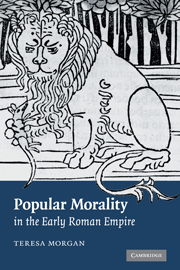Book contents
- Frontmatter
- Contents
- Preface
- List of illustrations
- List of tables
- List of abbreviations
- 1 Introduction
- PART ONE
- PART TWO
- PART THREE
- 10 The importance of being miscellaneous
- 11 Popular morality and high philosophy
- 12 Morality inter alia
- Conclusion
- Appendix 1 The political and literary connections of Babrius
- Appendix 2 The definition of a miscellany
- Appendix 3 Popular morality and philosophical doctrine
- List of papyri
- Bibliography
- Index
10 - The importance of being miscellaneous
Published online by Cambridge University Press: 27 October 2009
- Frontmatter
- Contents
- Preface
- List of illustrations
- List of tables
- List of abbreviations
- 1 Introduction
- PART ONE
- PART TWO
- PART THREE
- 10 The importance of being miscellaneous
- 11 Popular morality and high philosophy
- 12 Morality inter alia
- Conclusion
- Appendix 1 The political and literary connections of Babrius
- Appendix 2 The definition of a miscellany
- Appendix 3 Popular morality and philosophical doctrine
- List of papyri
- Bibliography
- Index
Summary
I against my brother
I and my brother against our cousin
I, my brother and our cousin against the neighbours
All of us against the foreigner.
Bedouin proverbIn the last section of this study, we place popular morality in a number of wider contexts, comparing it with the landscape of philosophical ethics and ethics in documents of various kinds. In this chapter, the wider context is that of miscellanies in general, and we shift focus from the content of morality to the form in which it was presented, in particular to those who could read.
Most people in the Empire doubtless picked up sayings and stories by hearing them used, everywhere from the kitchen to the council chamber via the marketplace and the parade ground. As a way of acquiring knowledge, this must have been, as it still is, a rather hit-or-miss affair, some people learning plenty of stories and tags, and others few. Seneca's observation, which we have amply confirmed, that many sayings and stories make essentially the same point, must have helped: if one happened never to hear a harsh, unpleasant man criticized as an ‘Areopagite’, one might come across the essentially synonymous, ‘rough as a hedgehog’.
For those who could read there was another route to knowledge. Stories and sayings were available in quantity, often more or less helpfully arranged by genre, theme, author or initial letter.
- Type
- Chapter
- Information
- Popular Morality in the Early Roman Empire , pp. 257 - 273Publisher: Cambridge University PressPrint publication year: 2007



